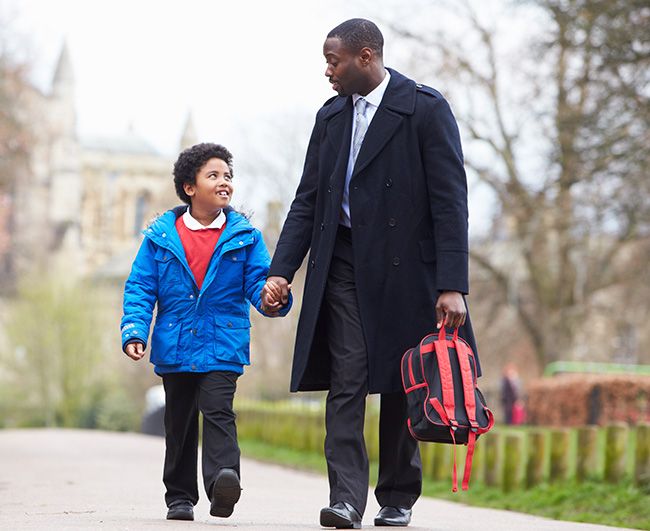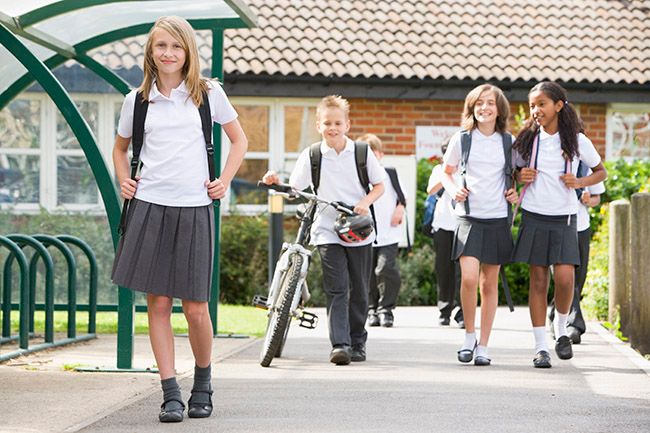When was the last time you walked your child to school? We know, it's often so much easier to jump in the car, especially if you're running late – but encouraging your kids to walk to school has a myriad of health benefits.
MORE: 7 helpful tips for combatting exam stress in teens from a psychologist
It's National Walking Month in May and Walk to School Week from 16-22 May, a five-day annual challenge for pupils to experience first-hand the importance of walking.
To get on board with this challenge, HELLO! asked Doctor, Psychiatrist and Living Streets' Chair Dame Jane Roberts about the benefits of walking to school.
WATCH: Royals on their first day of school
Dame Jane told us: "A generation ago, 70 per cent of children walked to school. Now it’s less than half. That’s despite most people living within two miles of their closest primary school. This has negative consequences for children’s mental and physical wellbeing, independence, road safety skills, traffic speed and volume, parking near schools, congestion and air pollution.
"Finding ways for your children to be more active is incredibly important at a time when one in five boys and one in six girls of primary school age are classed as physically inactive.
"This means they are not meeting the 60 minutes of physical activity a day that is recommended by the Chief Medical Officers of the UK. This is contributing to one in three children leaving primary school either overweight or obese.
"At Living Streets, we’re working to help as many families as possible to swap the school run for a school walk this Walk to School Week. So, here are five reasons for you to walk to school with your children this May..."
Walking improves physical health
Walking to school ensures children get out in nature, enjoy the fresh air, and get some exercise. It’s an easy and accessible way for your children to start getting active and build more exercise into their daily routine.
Even a short, brisk walk of just 20 minutes contributes to their recommended 60 minutes a day of exercise, and can have fantastic mental and physical health benefits – not just for children, but also for parents and carers that are walking the child to school too!
Walking helps to prevent long-term chronic health conditions such as certain cancers, type 2 diabetes, and heart disease and improves the management of existing conditions.
Walking has also been shown to reduce the likelihood of developing heart and lung conditions including high blood pressure. In fact, direct NHS savings from an increase in urban walking and cycling have been estimated at £17billion over 20 years.
Supporting your children to be more physically active from a young age instills good lifelong habits and increases the likelihood that they will continue to be physically active as adolescents and adults.
MORE: Duchess Kate and Princess Charlotte's sweetest mother-daughter moments in pictures
LOOK: 14 style trends for kids to try this spring
It maintains mental wellbeing
Walking is not only good for children’s bodies, but also for their minds and mood. Over half of parents interviewed in 2016 said that their child’s mood always or sometimes improves after walking to school (OnePoll, 2016).
Walking stimulates the release of neurotransmitters and brain chemicals, including endorphins, oxytocin and serotonin. These trigger positive and happy feelings, help improve mental wellbeing and reduce stress and anxiety. It also improves sleep and tackles depression and social withdrawal.
Given the worrying statistic that 15% of children aged 10-15 demonstrate symptoms of mental ill-health (ONS, 2018), the potential mental health benefits of encouraging your children to walk to school from a young age are significant.
It’s also been shown that children who walk to school arrive feeling more refreshed, alert and ready to learn. Children’s behaviour and concentration can improve as a result of regular walking, supporting teachers and schools to achieve the best learning outcomes.
Walking connects children with others and the wider world
Walking is also the perfect way for children to relax and connect with nature, the world, and those around them.
On their route to school, you should encourage your children to take time to absorb the sights, smells and sounds they encounter, and count how many different interesting things they see en-route. This helps to redirect their mental awareness to the environment, which can quieten the mind and focus it on the present moment.
It also brings a sense of calm to reduce heart rate, blood pressure and muscle tension. It can help children have a better understanding of their local area.
You can even take some pictures along the way on a camera or mobile phone, to capture some long-lasting memories and engage with children on the walk to make it more enjoyable.
A walk to school can also help children connect with other people and aid social development. This can be with their parent or carer that’s walking them, friends that they’re walking with or see on the journey, or even others in the area through a friendly smile and hello to a passer-by.
Walking with your children allows you as a parent to spend quality time with your child, giving them a positive avenue to express their thoughts, for you to provide emotional support, and help reduce any feelings of loneliness and isolation.
It helps the environment
Aside from the multitude of health and wellbeing benefits for both parents and children, walking to school can also ultimately help the environment.
The school run alone is responsible for generating half a million tonnes of CO2 per year, contributing to carbon emissions and air pollution, as well as road congestion.
By swapping a short car journey for a short walk to school, you can help to make the planet have cleaner air and clearer roads. Walking is free!
Walking to and from school is completely free!
Instead of using money for petrol, or the fare for a bus, train, or tram ride, walking your child to school can help save some money, while getting yourself and your children active and healthier in the process.
Living Streets, the UK charity for everyday walking, hosts the five-day annual Walk to School Week challenge, which this year is from 16th-22nd May 2022.
Last year, a record number of over 350,000 pupils across the UK took part, and parents, teachers and schools can join this growing movement now!
Like this story? Sign up to the HELLO! Family Hub newsletter to get other stories like this delivered straight to your inbox.











